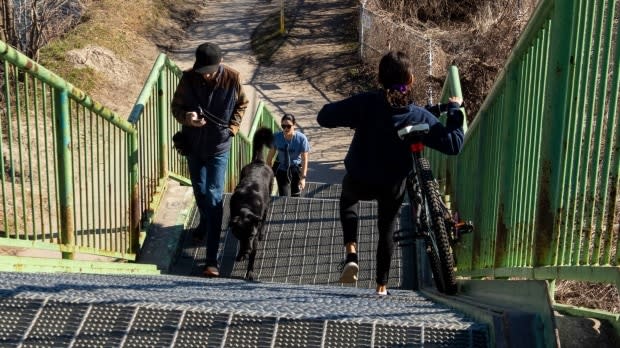Toronto could see up to 3,000 COVID-19 deaths, city facing $65M cost each week: officials

Toronto could see anywhere from 600 to 3,000 deaths by the end of the COVID-19 pandemic based on projections unveiled by the provincial government Friday, the city's medical officer of health says.
At the same time, the strain of COVID-19 is costing Toronto $65 million a week as revenues from deferred property tax, decreased transit use and increasing costs for things like personal protective equipment and additional shelter spaces, the city said Friday.
Mayor John Tory spoke of the increasing demands on the city at a news conference hours after Ontario unveiled worrying projections about the toll that the virus could take on the city, calling on both the provincial and federal government to do more to support cities bearing the brunt of the spread.
"I was scared," Tory said of his reaction upon seeing the projections. "I'm not ashamed to say that. Who wouldn't be?"
Tory also announced the city could impose a $1,000 fine on anyone caught breaking a bylaw announced Thursday, prohibiting people from standing within two metres of each other in city parks and squares. A judge could levy a higher fine if a case lands in court, up to a maximum of $5,000.
To date, the city has received almost 1,000 complaints about the use of parks and inappropriate physical distancing, and Toronto police have so far issued 21 tickets to individuals.
'These deaths are preventable'
The city announced Friday it is cancelling spring recreation, arts, and museum programs, meaning some 5,400 recreational workers normally hired at this time of year will not be.

The briefing follows the province's unveiling of what Premier Doug Ford deemed "stark" modelling projections for COVID-19 in Ontario, suggesting 1,600 Ontarians could die by the end of April if nothing more is done to stem the spread. All told, the models suggest the virus could kill 3,000 to 15,000 people over the course of the pandemic.
As of Friday afternoon, Toronto reported a total of 812 confirmed cases of COVID-19, another 174 probable cases, with 89 people in hospital, 42 of which are in intensive care. The city has also seen 13 deaths.
Of the infections so far, 27 per cent have been identified as community spread.
"These deaths are preventable. This is what keeps me up at night," Toronto's medical officer of health Dr. Eileen de Villa said.
De Villa called the modelling released by the province "sobering" and "even scary," but said she hopes it serves as a "wake-up call" to anyone not taking the need for physical distancing seriously.
Over half of province's cases in Toronto area
Since Jan. 15, 2020, Greater Toronto Area public health units account for 53 per cent of Ontario's more than 3,200 cases of the virus.

Meanwhile, the number of available intensive care beds in certain parts of the Toronto area is rapidly shrinking as the number of COVID-19 patients surges higher, according to data obtained by CBC News.
On Thursday, city officials announced a new bylaw prohibiting people from standing within two metres of each other in some parts of the city.
The bylaw will remain in effect for at least the next 30 days and is limited to interactions in city parks and squares, where city officials say they are seeing the most problems with crowding. The bylaw is also limited to two or more people who don't live together.
Toronto Public Health advised this week that people limit their time outdoors to essential trips, but the updated guidelines still allow for walking pets or getting daily exercise so long as physical distancing of two metres is possible.
The measures come as temperatures creep upward with the start of spring, with some converging on parks and boardwalks, raising concerns that the rules may not be being taken seriously enough.
Also Friday, the Toronto Zoo announced it is temporarily laying off 118 non-permanent employees. The changes, effective April 6, largely affect the zoo's guest relations, retail and membership, communications, events, custodial, transit and human resource staff, among other areas.
Another 275 summer positions are "on hold" until the city directs the zoo on a possible reopening date.
"It is important to note that animal care and staff safety remain our highest priorities and these staffing decisions do not impact full-time staff who work directly with our animals," spokesperson Katie Gray said in a statement.


